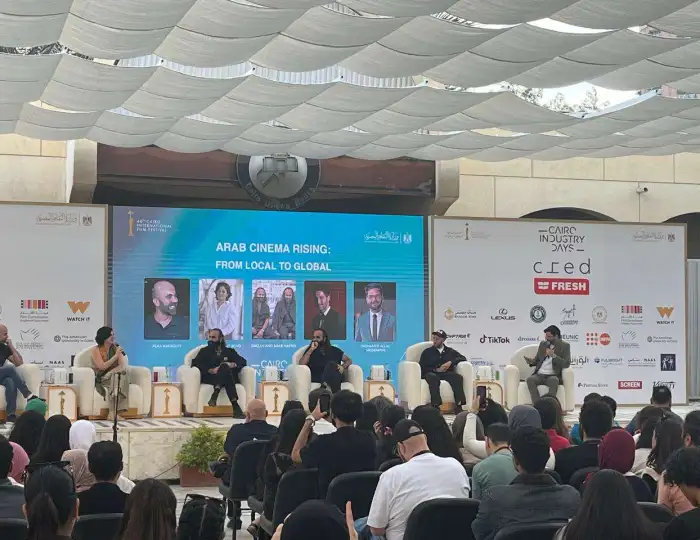
Attending the Arab Cinema Rising: From Local to Global masterclass at the 46th Cairo International Film Festival was like stepping into the engine room of Arab cinema — a space where stories, craft, and strategy collide in the quest for global resonance, and what it truly means for Arab films and filmmakers to transcend borders — not just to win awards or appear on streaming platforms, but to leave a human impact that travels across cultures.
The panel brought together voices that span the Arab world and beyond: the Egyptian actor Ahmed Malek, the Palestinian filmmaker duo Arab and Tarzan Nasser, festival programmer Sara Mansanit Royo, and industry strategist Alaa Karkouti. Moderated by critic Mohamed Hilal, the conversation unfolded organically, weaving industry realities with philosophical reflections on storytelling and international recognition.
One of the recurring themes was clear: being “international” is not the same as chasing Hollywood or global box office glory. international presence is meaningless if it doesn’t come with substance, the craft, the story, and the human performance must resonate universally.
Being international is about more than awards or box office numbers. Some films may sweep festivals and gain critical acclaim, yet remain virtually invisible outside professional circles. What matters more is designing projects that satisfy industry benchmarks while still retaining a deeply human core stories that can traverse borders because they speak to shared human experience.
The discussion then turned to actors navigating the global stage. Ahmed Malek highlighted the subtle, often unspoken limitations of ethnicity, cultural background, and national origin. To be truly “international,” an actor cannot simply be cast because of their Arab identity. Their craft must allow them to inhabit roles authentically, expanding beyond comfort zones to explore diverse stories. Exposure alone is insufficient impact comes when a performer is genuinely suited for the role and can deliver a performance that resonates on a human level.
The case of Omar Sharif was invoked as a touchstone for this conversation: a native Arab actor whose global presence stemmed from both talent and cultural adaptability. The Nasser brothers emphasized that actors and filmmakers alike must engage with human stories not just politically charged or socially urgent narratives — for their work to carry weight internationally.
Not all festivals are created equal, the panel noted. Smaller, more flexible festivals often provide wider opportunities, selecting films that may not fit the rigid narratives preferred by larger European events. International programming frequently prioritizes stories that align with existing cultural expectations: a European love story, for example, may be easily accepted, while a love story from Arab cinema often needs a surrounding struggle or political tension to gain recognition.
These realities can be frustrating. Panels, festivals, and streaming platforms are increasingly important, but they often favor depictions of poverty, political oppression, or cultural conflict. While such stories are crucial, the danger lies in pigeonholing Arab cinema as only “social struggle” or “resistance” cinema.
A recurring insight was Egypt’s unique position in the region. Its cosmopolitan cities, widely understood dialect, and scalable audience make it the ideal launchpad for Arab films seeking global exposure. Non-Egyptian Arab films face systemic challenges: limited theater access, smaller audiences, and the complexities of distribution across borders. As Alaa Karkouti. noted, platforms offer opportunities, but audience behavior still favors the familiar — the known actors, the stories they’ve already encountered.
Though platforms, have reshaped possibilities. They allow Arab films to travel further than ever, but as the panel stressed, algorithms alone cannot guarantee connection. For a story to matter globally, it must touch on fundamental human experiences. It’s not enough to depict a specific struggle or cause; the narrative must be inherently relatable, regardless of geography. Here, craft is key: acting, writing, and production need to meet a global standard without diluting cultural authenticity.
Streaming has changed the landscape. Platforms started with great promise, democratizing access and creating new pathways for Arab stories to reach global viewers. Yet algorithm-driven recommendation systems and audience habits still constrain the impact of many films. Despite these challenges, the panelists agreed that the very presence of these films online has begun to reshape consumption patterns, and the appetite for exploration, though nascent, is growing.
At its heart, the masterclass stressed a fundamental truth: international success is not simply a matter of exposure or strategy; it begins with the human story. Whether through craft, performance, or narrative, Arab cinema’s future on the global stage depends on its ability to connect universally, while remaining rooted in authentic local experiences. Awards, festival selections, and streaming views matter, but their ultimate value lies in the emotional and intellectual resonance of the work itself.
By the end of the session, one message emerged with clarity: Arab cinema is rising, not just in terms of visibility, but in its capacity to move, challenge, and inspire across borders. For filmmakers, actors, and audiences alike, the journey from local to global is a matter of craft, courage, and commitment to stories that truly reflect the human condition.
